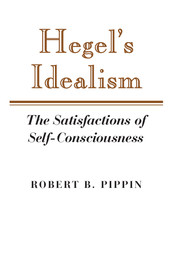Book contents
7 - Satisfying self-consciousness
Published online by Cambridge University Press: 05 June 2012
Summary
Hegel's turning point
In a dramatic passage at the beginning of Chapter 4, Hegel sums up the importance of the discussion that follows for the rest of the PhG, and especially for the idealism theme we have been pursuing:
It is in self-consciousness, in the Notion of Spirit, that consciousness first finds its turning-point, where it leaves behind it the colorful show of the sensuous here-andnow and the empty night of the supersensible beyond and steps out into the spiritual day of the present.
(PhG, 108–9; PS, 110–11)What might have seemed the determinacy and solidity of empirical knowledge has turned out to be a mere “colorful Schein”; what might have seemed the purely rational determination of the “inner essence” or true ground of the sensible world has turned out to be an “empty night.” And with the problem formulated in these obviously Kantian terms (empirical skepticism versus dogmatic rationalism), Hegel now refers again, as we have seen him do in so many other contexts, to the supreme Kantian condition of experience, self-consciousness, as “the answer,” the “spiritual day” (geistigen Tag), or, earlier, the “native realm of truth” (PhG, 103; PS, 104), a way of understanding how the “self's relation to itself” will supposedly avoid such dead ends in consciousness's examination of itself and its possible knowledge.
- Type
- Chapter
- Information
- Hegel's IdealismThe Satisfactions of Self-Consciousness, pp. 143 - 172Publisher: Cambridge University PressPrint publication year: 1989



